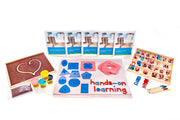Have you ever had this experience? Where your child freezes up during school. Or that moment when they’re supposed to be completing a work they’ve done before. All of a sudden, they’re putzing around, playing, distracted, or staring with a total blank face.
Oftentimes when these moments occur, we get frustrated. I think our default is to assume the child is trying to get out of their work.
Sometimes we assume they would rather play than work. Or we believe they are ignoring our directions or being disrespectful.
Allow me to present a different option.
Why Kids Freeze Up During Lessons
Sometimes our children freeze up or act out while learning because they’re being stubborn. Yes, this is true. Yet, it’s often not that at all. In most cases a child is freezing up or acting out during school for a much different reason then parents understand. If your student is frustrated, acting up, or freezing- consider looking at it from a different point of view. I’ll share some common reasons learning doesn’t go as planned, then share some tips for what to do.
One of the most common reasons kids freeze up or don’t engage, is overwhelm. Even if it’s a lesson you’ve gone over before. It can happen if it’s a work your child has completed a task with success many times over. Sometimes our kids get overwhelmed and their brains can’t handle it. Children’s brains are growing fast. They are taking in countless tidbits of new information each day. Just as we sometimes have “mom brain” and forget things, our children forget things too. If you find your child sitting in front of a familiar task and acting like they’ve never seen it before, or acting out, they may feel overwhelmed.
This is also true for a brand new subject or work. The work may be age appropriate and the next most logical thing for them. Their brain might be too overloaded to handle something new. Children will often “be sick” or have to potty when they get overwhelmed as well.
They might also think the lesson is too hard. If a child views something they don’t think they’re capable of doing, all kinds of unusual behaviors can surface. Often a child who is not hyperactive will start being hyperactive. They may all of a sudden need to reorganize their entire area. They may break down and cry. Your child may not have the words to express that the task feels too big for them to handle.
Freezing up or acting out during school requiring writing is one of the most commonly cited. It can be challenging for a child’s brain to process thoughts, the proper way to hold a pencil, how to spell words, getting the words out on paper in the right order, etc. The writing process is complex and often too much for kids to handle. Some children may not be ready to do creative writing on their own until they are 9 or 10.
Children have a large need for movement. Especially for young children, not moving much can be a large barrier to learning. Another reason a child may shut down or seem to “act up” is because they need more movement. Children may get fidgety, start bouncing around, or having a hard time focusing when they need movement.
Subject length is something many families struggle to find a balance on. Some children can focus on a single subject for 30+ minutes, others may only be able to focus for five. If your child is losing interest, zoning out, or acting up- the length may be too long for them to understand. This goes hand in hand with overwhelm. Long lessons can be hard for children to follow and stay engaged with.
One reason many families cite for homeschooling is more time together. Especially in larger families, children may display unusual behaviors when they’re needing attention. What is viewed as disrespectful behavior might be their way of saying “notice me.” Many children have learned that they can act up or freeze during school to get extra attention from Mom.
Other possible options for struggles during a homeschool lesson vary based on age, health, and unique needs of the child. If they are dehydrated, hungry, overstimulated, need a sunshine or fresh air boost, have low blood sugar, or need to stretch- your session may suffer. Any of these can create problems for adults and children alike.
What to Do When A Child Struggles During Their Lesson
Our children are still learning to identify feelings and use their voices. While they may not exactly know what’s causing them to freeze up or act in an unusual manner, adults can help. Offering alternatives and solutions during periods of struggle may turn your school day from one of tears to one of fun.
Try a brain break- snuggle up for a read aloud, let the child crawl under the table for some alone space for a while, do some yoga, or give a massage.
Stop the task and come back to it later- one of the joys of homeschooling is we can try again another time. Stopping an activity to come back to later during the day, week, month, or year is okay. Try some of these other tips and come back to it.
Go to something that’s an easy victory- then try the other lesson. This is huge for a lot of kids. Some parents even set up their day to have an easy victory before a challenging task. Perhaps you allow them to work on a task they have completed many times. You may also decide to pull out an easier work from months gone by that you know they can master. The little confidence boost of completing a task quick and easy provides a good boost of endorphins for something harder.
Try large motor movements- don’t underestimate the power of movement. For some children flipping cartwheels or doing push ups suffices. Other children actually enjoy some hard, physical movement. Try pushing a chair across the kitchen, assembling a folding table, or similar task. This can be helpful for children with sensory processing difficulties.
Cross the midline- this helps connect the right and left sides of the brain. It can be quite remarkable to see what happens to a child who is frozen over a task. Have your child touch their opposite hand to foot, elbow to knee, rub the opposite ear with their hand, cross arms and rub shoulders, etc.
Do something creative- especially before Math and Language Arts. Parents often report their children work more willingly, and with more success, when they’re creative. Allowing a child to do some art or build with Legos before a task requiring a lot of focus and concentration may help prevent them from freezing up.
Take a play break- sometimes a kid needs to play!
Figure out a way to spend 1:1 time with each child, even if it’s only 10 minutes. I know it seems impossible sometimes. This can be helpful though. Getting a bit of 1:1 time helps the child to feel connected and heard.
Get some sunshine, have a snack, breathe in the fresh air and grab a drink. Sometimes it’s the most basic of things that our children (and us!) need to move forward.
I hope this has been helpful for you. It can be incredibly frustrating when our homeschool lesson isn’t going as planned. Making sure our children have options and alternatives is important. Often we default into consequences assuming it’s defiant behavior. These simple tips can change everything.
Want more inspiration and tips for smoother homeschool days?
Check out these posts:
Grace and Courtesy FREE Activity Pack
Parenting Styles That Use Positive Discipline Aren’t New- Montessori Has Taught This for 110+ Years






